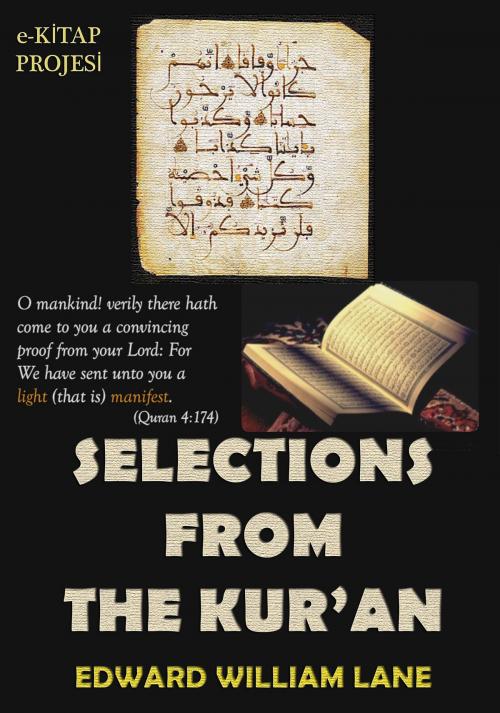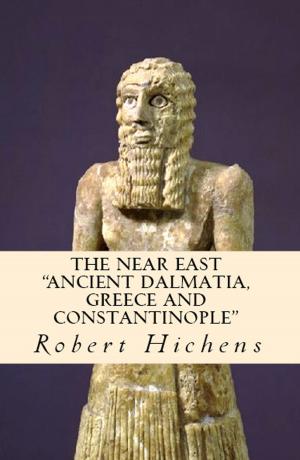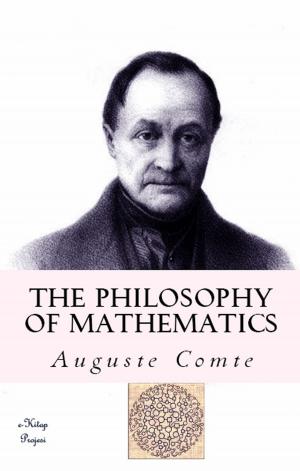| Author: | Edward William Lane | ISBN: | 9786155564659 |
| Publisher: | eKitap Projesi | Publication: | April 8, 2015 |
| Imprint: | eKitap Projesi | Language: | English |
| Author: | Edward William Lane |
| ISBN: | 9786155564659 |
| Publisher: | eKitap Projesi |
| Publication: | April 8, 2015 |
| Imprint: | eKitap Projesi |
| Language: | English |
There are several translations of the Kur-an in several languages; but there are very few people who have the strength of mind to read any of them through. The chaotic arrangement and frequent repetitions, and the obscurity of the language, are sufficient to deter the most persistent reader, whilst the nature of a part of its contents renders the Kur-an unfit for a woman’s eye.
Yet there always has been a wish to know something about the sacred book of the Mohammadans, and it was with the design of satisfying this wish, whilst avoiding the weariness and the disgust which a complete perusal of the Kur-an must produce, that Mr. Lane arranged the ‘Selections’ which were published in 1843. In spite of many printer’s errors, due to the author’s absence from England, the book was so far successful that the edition was exhausted, and it is now very difficult to obtain a copy. But partly owing to the obstructions to the reading offered by an interwoven native commentary, and partly by reason of the preference shown for the doctrinal over the poetical passages, the book went into scholars’ hands rather than into the libraries of the general reading public. It has proved of considerable service to students of Arabic, who have found it the most accurate rendering in existence of a large part of the Kur-an; and even native Muslims of India, ignorant of Arabic, have used Lane’s ‘Selections’ as their Bible.
In this edition I have endeavoured rather to carry out the original intention of the translator. Experience has shown that the first plan was over-learned to commend itself to the average reader, for whom Mr. Lane had destined the book; in this edition I have therefore omitted many of the notes, which will not be missed by the reader for whom the book is intended, and for which the Arabic scholar has only to refer to the first edition, or to Sale’s Koran, whence most of them were derived. Again, the text of the first edition was obscured and interrupted by an interwoven commentary, which destroyed the pleasure of the language and often made the meaning less intelligible than before. This commentary has been thinned. Where it added nothing to the text, it has been erased; where it gave a curious or valuable explanation, it has been thrown into a footnote; where it merely supplied a necessary word to complete the sense, that word has been left in the text distinguished by a different type[1]. Once more, the early and wilder soorahs were almost wholly omitted in the first edition, whilst the later more dogmatic and less poetical soorahs were perhaps too fully represented. I have endeavoured to establish the balance between the two.
In this edition the Selections are divided into two parts. The first is Islam; the second, other religions as regarded in Islam. In the first are grouped, under distinctive headings, the more important utterances of Mohammad on what his followers must believe and do; in the second are his versions of the history of the patriarchs and other personages of the Jewish and Christian writings.
There are several translations of the Kur-an in several languages; but there are very few people who have the strength of mind to read any of them through. The chaotic arrangement and frequent repetitions, and the obscurity of the language, are sufficient to deter the most persistent reader, whilst the nature of a part of its contents renders the Kur-an unfit for a woman’s eye.
Yet there always has been a wish to know something about the sacred book of the Mohammadans, and it was with the design of satisfying this wish, whilst avoiding the weariness and the disgust which a complete perusal of the Kur-an must produce, that Mr. Lane arranged the ‘Selections’ which were published in 1843. In spite of many printer’s errors, due to the author’s absence from England, the book was so far successful that the edition was exhausted, and it is now very difficult to obtain a copy. But partly owing to the obstructions to the reading offered by an interwoven native commentary, and partly by reason of the preference shown for the doctrinal over the poetical passages, the book went into scholars’ hands rather than into the libraries of the general reading public. It has proved of considerable service to students of Arabic, who have found it the most accurate rendering in existence of a large part of the Kur-an; and even native Muslims of India, ignorant of Arabic, have used Lane’s ‘Selections’ as their Bible.
In this edition I have endeavoured rather to carry out the original intention of the translator. Experience has shown that the first plan was over-learned to commend itself to the average reader, for whom Mr. Lane had destined the book; in this edition I have therefore omitted many of the notes, which will not be missed by the reader for whom the book is intended, and for which the Arabic scholar has only to refer to the first edition, or to Sale’s Koran, whence most of them were derived. Again, the text of the first edition was obscured and interrupted by an interwoven commentary, which destroyed the pleasure of the language and often made the meaning less intelligible than before. This commentary has been thinned. Where it added nothing to the text, it has been erased; where it gave a curious or valuable explanation, it has been thrown into a footnote; where it merely supplied a necessary word to complete the sense, that word has been left in the text distinguished by a different type[1]. Once more, the early and wilder soorahs were almost wholly omitted in the first edition, whilst the later more dogmatic and less poetical soorahs were perhaps too fully represented. I have endeavoured to establish the balance between the two.
In this edition the Selections are divided into two parts. The first is Islam; the second, other religions as regarded in Islam. In the first are grouped, under distinctive headings, the more important utterances of Mohammad on what his followers must believe and do; in the second are his versions of the history of the patriarchs and other personages of the Jewish and Christian writings.















